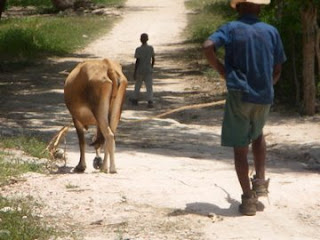


Hello and Bonjou,
Dear friends and family we have finally heard from the village of Matenwa on Lagonav, Haiti. The mountain top community has been devastated by the succession of violent hurricanes.
In the sixteen years we’ve known and been involved with Chris and the Matenwa Community School there, we have never received such bad news or such an outright appeal for immediate aid.
Abner, the principal and co-founder of the school fears children will soon die without food aid. While we were there this summer we witnessed many children eating every other day or if they went to school, the meal they were served there at lunch was the only food they had had that day. As you can imagine these kiddos have very little reserves.
Fortunately the infrastructure of the school is sound, they are still able to cook and serve food but the cost of procuring food (mostly rice and beans) is extremely high. Fifteen dollars will feed a child breakfast three times a week for a month.
Thirty-nine of the poorest families have had all or part of their homes wash away. Food crops, already scarce have washed away, as well as many of their precious goats and chickens. Five hundred dollars will rebuild a room on a home.
We still have some of the incredible embroidered artwork and gorgeous silk batik scarves of the Women’s Artist Collective of Matenwa. We would be happy to hook you up with tangible evidence of the creativity, resiliency, power and love that these people put out into the world.
Max is launching a bake sale and presentations at his school. Please log onto our travel blog website for more information about our trip to and about Matenwa. There are many photos of our strong, kind, generous friends there.
I realize you may be besieged with constant pleas for assistance from many deserving venues. Please disregard this message if you are at all uncomfortable with our direct asking for monetary help. We have built relationships with the children and families of Matenwa, Haiti just as we have in Portland, Oregon. We only hope to be bridges of education, respect and friendship. Thank you, sincerely, for your consideration.
Peace,
Mariam Higgins
mariamhiggins@blogspot.com
maxshiatianhiatus@blogspot.com
Please feel free to give generously directly to the Matenwa Community through Beyond Borders:
On-line at www.BeyondBorders.net
In order to direct your donation to Matènwa scroll to: Please let us know where to direct your gift and click on Matènwa Learning Ctr (school) or Matènwa Learning Ctr (Breakfast).
By mail to: Beyond Borders/MCLC , Box 2132, Norristown, PA 19404.
Your check should be made to: "Beyond Borders/MCLC"
15 dollars feeds a child breakfast 3 times a week for a month. 500 will rebuild one room of a house.
Thank you for your generosity at this time of exceptional need.
Christine W. Low
Abner Sauveur
Co-Directors, MCLC
www.matenwaclc.org
617 543 8844
Please contact me if you would like to do a service learning project at your school.
Please consider sending this note on to your friends.

















































